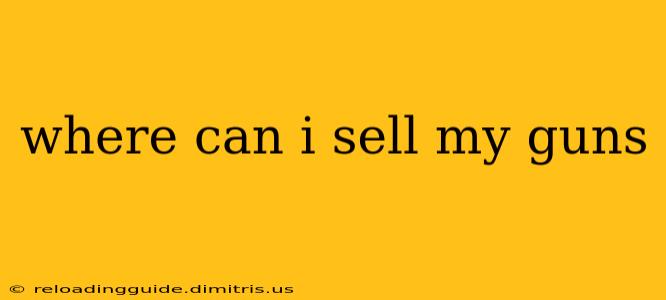Where Can I Sell My Guns? A Comprehensive Guide to Safe and Legal Firearms Sales
Selling a firearm can be a complex process, requiring careful navigation of legal regulations and safety protocols. This guide aims to provide a comprehensive overview of your options, emphasizing responsible gun ownership and adherence to the law. It is crucial to understand that laws regarding firearm sales vary significantly by state and even locality, so always check your local and state regulations before proceeding.
Understanding the Legalities of Firearm Sales
Before exploring where you can sell your guns, it's vital to understand the legal framework surrounding firearm transactions. Key aspects include:
- Federal Regulations: Federal law governs certain aspects of firearm sales, particularly those involving licensed dealers. These regulations often dictate record-keeping, background checks, and prohibited persons.
- State Laws: States have their own laws that may be stricter than federal regulations. These laws can vary widely, covering areas like waiting periods, permissible types of firearms, and required licensing for sellers.
- Local Ordinances: Cities and counties may also have their own ordinances that further restrict firearm sales.
Failure to comply with these regulations can result in serious legal consequences, including fines and imprisonment.
Options for Selling Your Firearms
Once you've fully understood the relevant laws in your area, you can consider these options for selling your guns:
1. Licensed Firearms Dealers (FFLs):
- Pros: This is often the safest and most legally compliant method. FFLs are required to conduct background checks on all purchasers, ensuring the firearm doesn't fall into the wrong hands. They handle all the paperwork, minimizing your liability.
- Cons: You'll likely receive less money than selling privately, as they need to make a profit. The process can also be more time-consuming.
2. Private Sales:
- Pros: You can potentially get a higher price than selling to a dealer.
- Cons: This carries significantly more legal risk. You're responsible for complying with all applicable state and local laws, including background checks (if required in your jurisdiction). You must also take precautions to ensure the buyer is legally allowed to possess a firearm. Improper private sales can lead to severe penalties.
3. Online Gun Auction Sites:
- Pros: These platforms can reach a wider audience of potential buyers.
- Cons: Similar to private sales, online platforms carry legal risks. You must strictly adhere to all regulations and be mindful of the buyer's legal status. The process of transferring the firearm also needs to comply with the law, often requiring interaction with an FFL. Scams are also a potential concern.
4. Consignment Shops:
Some gun shops offer consignment services. This means they'll sell your firearm on your behalf for a commission. This option combines some of the advantages of private and dealer sales.
Safety Precautions When Selling Firearms
Regardless of your chosen method, prioritize safety:
- Secure Storage: Keep your firearm securely stored until the sale is complete.
- Thorough Background Check (where applicable): Comply with all background check requirements.
- Safe Transfer: Arrange a safe and secure location for the transfer of the firearm.
- Proper Documentation: Maintain accurate records of the sale, including the buyer's information and the date of the transaction.
This guide provides general information. Always consult with legal counsel and your local law enforcement agencies to confirm the legality and safety of selling your firearms in your specific jurisdiction. Responsible gun ownership includes understanding and abiding by all relevant laws.

